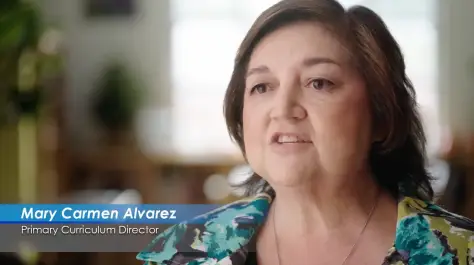Throughout my journey over the past three decades as an early childhood educator, I have been a firm believer that investing in our youngest learners is one of the greatest decisions we can make. It is during the first few years of a child’s life that foundational learning occurs, and smart investments in effective early childhood programs can have enormous benefits for current and future generations. But unfortunately, for far too many students, inequality at the starting gate is a lifelong barrier to academic success.
Where I teach in Harlingen, Texas, just a few miles from the U.S./Mexico border, our student body is largely economically disadvantaged. I have a front-row seat in witnessing the impact that a lack of readiness for kindergarten and beyond has on students, and my colleagues and I are always looking for ways to solve that challenge.
In the fall of 2019, Harlingen Consolidated Independent School District (HCISD) launched a universal full-day pre-K program for four-year-old children at no cost to families. Affordability is the number one deterrent to enrolling in pre-K, so we dedicated the resources to make it accessible to everyone in the community. Through this program, we began to instill a strong foundation in literacy and math in these young learners.
However, shortly after the program started, COVID-19 forced us to rethink how we could academically support the pre-K students. While remote learning was difficult for all, our youngest learners faced particularly acute challenges when in-school learning was no longer possible. Our priority was to ensure that district closures would not negatively impact our pre-K students academic growth and development. We also needed to make sure they had access to programs at home to keep them engaged in valuable learning experiences.
That’s when a longtime colleague with decades of experience in early education introduced me to My Math Academy, a personalized, adaptive math program from Age of Learning designed to help children in pre-K through 2nd grade master fundamental math concepts and skills. The program provides personalized instruction, giving teachers tools to help children whether they’re at home or in the classroom.
We began using My Math Academy in Harlingen during remote instruction at the start of the pandemic, and educators immediately found that it was an engaging and easy-to-use tool during virtual learning. I’d often hear from teachers about how they quickly saw a positive change in how their students were building math skills. Thanks to those individual student’s successes, we have continued using it in person as well.
One of the ways My Math Academy is a unique and effective solution is that it meets each student exactly where they are. The program continuously assesses math skills and personalizes instruction with fun, just-right challenges specific to each student’s individual learning progress. While students are learning math through highly engaging, game-based activities, educators can also track their progress in real time.
It reminds me of how great doctors approach treating patients. They use personalized data to enable more informed decision-making, which leads to better health outcomes. That’s what teachers in Harlingen are doing. My Math Academy’s technology empowers educators to identify accomplishments and points of struggle, and it provides guidance on student groupings and instruction recommendations.
This past fall, based on the overwhelmingly positive results we achieved with our initial pilot of My Math Academy, we expanded the program beyond pre-K students and classrooms. We now have 5,200 students and 300 teachers using My Math Academy from pre-K through early elementary school. We were already seeing progress early in the school year, and both teachers and students have been encouraged by this new way of mastering math.
For students in Harlingen, there have been remarkable academic outcomes in math.
Skill levels have nearly tripled for pre-K students and increased 50% for kindergarteners who participated in the program. And perhaps most impactful is that the students in each school started with different skills, with some students being further behind than others. But in every school, students mastered all pre-K skills and continued well into kindergarten, thanks to My Math Academy’s personalized instruction.
We had children entering kindergarten this year learning math at a 2nd-grade level, an accomplishment that I hope will become the norm over time.
Not only are we achieving demonstrable learning gains, but we are closing the equity gap and creating a strong learner identity. Children often wear their emotions on their sleeves, and after watching this math miracle take place over the last 15 months, not only is it evident that they are learning, but they love learning.
